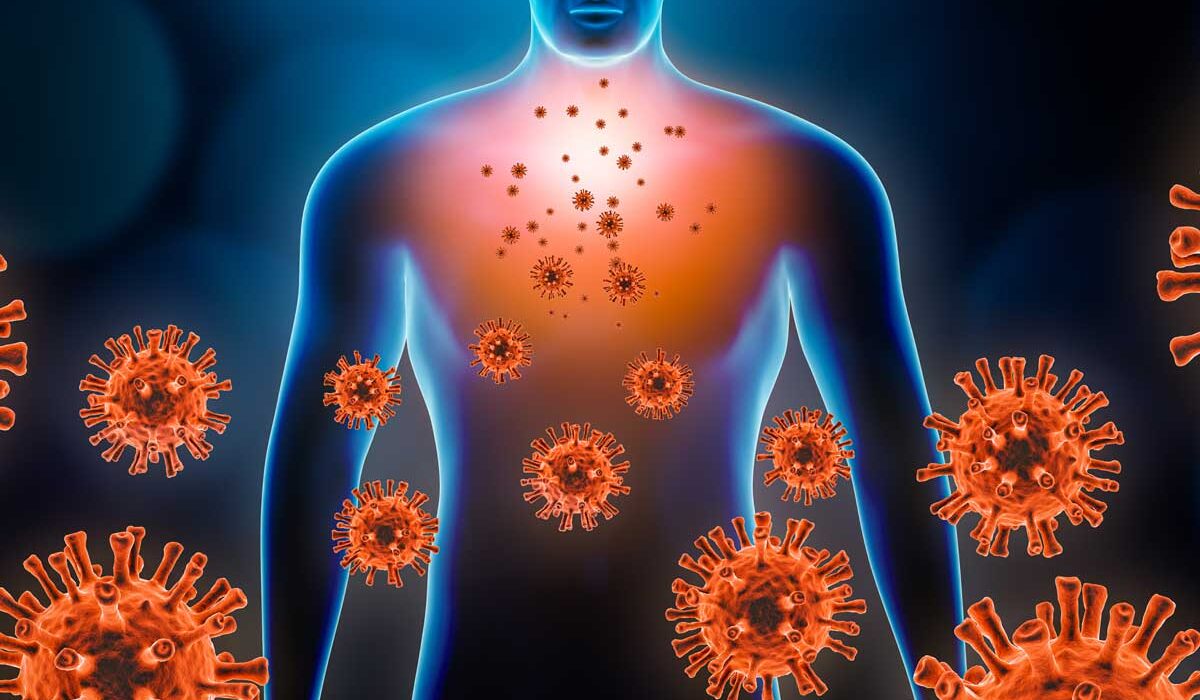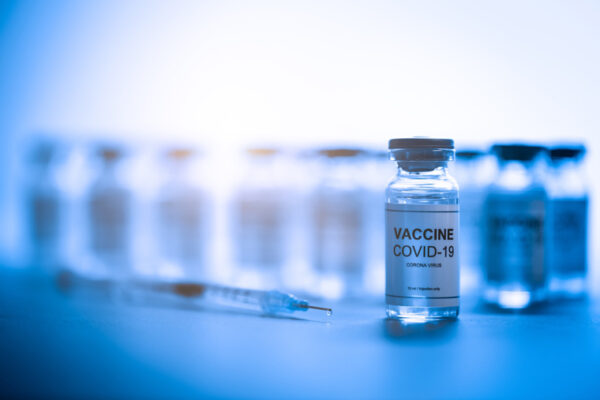Studying blood plasma samples from COVID-19 patients, researchers at Washington University School of Medicine in St. Louis have identified specific proteins that may help predict which patients may need to be placed on ventilators to breathe and which are most likely to die of the virus.
“Identifying harmful proteins may be helpful as we confront not only variants of the virus that causes COVID-19, but also as new viruses emerge in the future,” said principal investigator Carlos Cruchaga, director of the NeuroGenomics and Informatics Center at the School of Medicine. “We may be able to draw blood from an individual with a COVID infection, check the levels of these key proteins and quickly determine risk for serious outcomes. We then could use that information to determine the best course of treatment.”
The results are published online in the journal iScience.
Cruchaga, also the Barbara Burton and Reuben M. Morriss III Professor of Psychiatry, studied plasma samples from 332 COVID-19 patients admitted to Barnes-Jewish Hospital in St. Louis and compared them to plasma samples from 150 people who had not been infected with SARS-CoV-2, the virus that causes COVID-19. Because the samples were obtained as patients were being admitted to the hospital, the proteins linked to worse COVID-19 outcomes were identified long before any patients actually were placed on ventilators or died from the virus.
To study the proteins in the blood plasma, the researchers used a technique called high-throughput proteomics to identify overexpression and underexpression — also known as dysregulation — of the proteins. The scientists conducted additional testing to distinguish which of the proteins actually caused severe illness from those that became dysregulated as a result of severe illness.
Although the research team identified a large number of proteins that were altered in patients with COVID-19, they determined that the presence of any of 32 proteins that become dysregulated during COVID infection indicated that patients would require breathing assistance from a ventilator. They identified another five proteins that, when found to be altered in blood plasma as a result of the virus, indicated likelihood of death for the patient.
“Many of the proteins we identified were related to inflammation and to the body’s immune response, for example, so it wasn’t surprising to find them altered by COVID infection,” Cruchaga said. “But a subset of these proteins raised the likelihood that patients would need ventilation or go on to die. Using these proteomics approaches, we now have a methodology that allows us to predict problems, and that can be very important for clinical practice.”
Among the 332 COVID-19 patients studied, those whose blood plasma had any of 32 dysregulated proteins — proteins that indicated they might require ventilation to breathe — eventually did require breathing help, typically about a week after admission to the hospital (82 patients). And of the 332 patients, only those who had alterations in five proteins the scientists linked to severe illness eventually died due to infection (63 patients).
To further test their findings, the researchers studied similar proteomics data from 297 COVID-19 patients and 76 controls at Massachusetts General Hospital in Boston and found that the same proteins indicated the eventual need for ventilators and the likelihood of death in both groups of patients.
The study involved blood plasma from patients hospitalized during the initial surge of patients with COVID-19, so it’s not clear whether precisely the same proteins would lead to ventilation and death from infection with later variants of the virus, Cruchaga said. However, the same approach of using high-throughput proteomics likely could be used to validate or identify suspect proteins in other variants, he said. The strategy may even be useful with completely different viruses, he added.
The research also showed that some of the proteins that were dysregulated during COVID-19 infection were linked to coronary artery disease and Alzheimer’s disease pathways, confirming that COVID-19 can increase the risk for these disorders.
“That was a surprising finding, because this project was not focused on those issues,” Cruchaga said. “Some of the proteins we identified are causal proteins in Alzheimer’s pathology, and others are used as biomarkers for Alzheimer’s disease, both in the blood and in the cerebrospinal fluid. COVID infection altered the levels of those biomarkers to the point where if someone was to go to the clinic for a blood test, the neurologist might even diagnose that patient as having Alzheimer’s disease, when in fact what the blood test is revealing is that the patient recently had COVID-19.
“This is a good example of how high-throughput approaches are going to help us understand that COVID is not only a disease affecting the lungs but one that also affects the brain and the heart.”
Cruchaga added that this study provides a biological basis for understanding some of the symptoms associated with long COVID-19. And he said it’s possible that studying these proteins in blood plasma potentially could identify people at high risk for developing such symptoms after COVID infection.
“Although fewer people are dying from COVID-19 these days, its impact on memory in people who are cognitively normal and on disease progression in people who already have cognitive problems is of concern,” he said.
Wang L, Western D, Timsina J, Repaci C, Song WM, Norton J, Kohlfeld P, Budde J, Climer S, Butt OH, Jacobson D, Garvin M, Templeton AR, Campagna S, O’Halloran J, Presti R, Goss CW, Mudd, PA, Ances BM, Zhang B, Sung YJ, Cruchaga C. Plasma proteomics of SARS-CoV-2 infection and severity reveals impact on Alzheimer’s and coronary disease pathways. iScience, March 14, 2023.
The study was funded by the National Institute on Aging, the National Cancer Institute and the National Center of Advancing Translational Sciences of the National Institutes of Health (NIH). Grant numbers: RF1 AG074007, R01 AG044546, P01 AG003991, RF1 AG053303, RF1 AG058501, U01 AG058922, P30 AG066444, P01 AG03991, P01 AG026276, P30 CA091842, UL1 TR002345. Additional funding provided by an Alzheimer’s Association Research grant, an Alzheimer’s Association Zenith Fellows Award, and the Chan Zuckerberg Initiative.
About Washington University School of Medicine
WashU Medicine is a global leader in academic medicine, including biomedical research, patient care and educational programs with 2,800 faculty. Its National Institutes of Health (NIH) research funding portfolio is the third largest among U.S. medical schools, has grown 52% in the last six years, and, together with institutional investment, WashU Medicine commits well over $1 billion annually to basic and clinical research innovation and training. Its faculty practice is consistently within the top five in the country, with more than 1,800 faculty physicians practicing at 65 locations and who are also the medical staffs of Barnes-Jewish and St. Louis Children’s hospitals of BJC HealthCare. WashU Medicine has a storied history in MD/PhD training, recently dedicated $100 million to scholarships and curriculum renewal for its medical students, and is home to top-notch training programs in every medical subspecialty as well as physical therapy, occupational therapy, and audiology and communications sciences.



